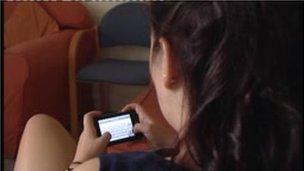Running away from care and into sexual abuse
- Published

'They get your number and they know you are vulnerable. So they will contact you'
Children who run away from care are at risk of sexual abuse and the system in England is failing to protect them according to a report by MPs.
One teenager told BBC News her story.
Louise, not her real name, was barely 14 and in foster care miles away from family and friends when she was preyed on by a group of men.
They plied her with drink and drugs and sexually exploited her.
Her family life had broken down and she had been passed around a series of foster parents and care homes.
She was once moved three times in two weeks: "It's so nerve-wracking ... it's just so unsettling. It really gets inside you ... I was so unhappy.
"You're not with your family and you're being moved around all the time. It's just, you don't know how to feel. I guess you are just by yourself. You feel really lonely."
Louise says some of the foster parents were caring and kind, others she says were "horrible".
"You can tell the ones that are actually in it for care and the ones that aren't, because they are really distant.
"You get some of them that are really supportive of you, like they give you hugs and take you out but other ones are really away from you and you have to do your own thing in the house and it's horrible."
She began to break curfews and later to run away. She now says she cannot remember the number of times she ran away.
"It's just you feel like you need to be with someone else. Like you are not with your family and you just want to be away from care.
"You don't get the support and you don't get listened to and it just makes it so difficult so you just want to run away from it all."
'Grooming' process
Social networking sites provided the initial contacts with the men who at first behaved like friends and later exploited her.
"They get your number and they know you are vulnerable. So they will get in contact with you."
Louise began meeting the men in real life around the time of her 14th birthday. At first she mistook their grooming process for genuine love and affection.
She recalls: "I was never listened to when I first came into care. You are in a state and you don't know what you are doing with yourself and I think you just want attention, you just want affection."
The men were careful never to be seen with her in public. She had to go to them.
"They would usually get me drunk, and drug you. So you don't know what you are doing ... and then they do what they want but if you refused - like I refused one person and got hit in the face and after that I couldn't remember what happened to me until I got home.
"It makes me feel sick that I could do that - that I could even go to them. But at the end of the day they just wanted one thing and that makes them disgusting."
Louise says her foster carers initially had little idea what was going on.
"Sometimes they were aware that I was meeting boys and things but they never really knew until I got back with cuts on my face and things like that."
Eventually Louise did get the help and support she needed. Now aged 16 she is back in education and has begun to pull her life together.
And two years after the grooming began, she has developed a good understanding of what children in care need most.
"I think they need to get more support, to be able to talk to someone and let their feelings out and to be able to get that attention but off the right people... not the wrong ones...
"It really does help... the more you are listened to the more you feel safer where you are and you know that you shouldn't go out and do the wrong things."
- Published18 June 2012
- Published13 June 2012
- Published12 June 2012